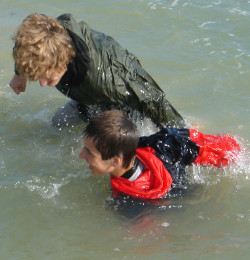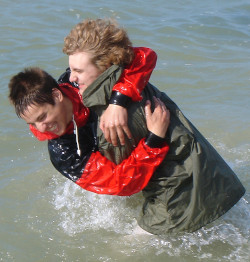Rockpooling / Coasteering / Coastal Traversing
Rockpooling is a beach activity that encompasses movement along the intertidal zone of a rocky coastline on foot or by swimming, without the aid of boats, surf boards or other craft. It is difficult to define the precise boundaries between, for example, rockpooling and ocean swimming.
This fun activity is also known as coastal traversing, rock hopping and the like. You trek along the shore of a lake or the sea, enjoy nature, look at plants and creatures, take photos and swim from place to place.
One way to discover more about the wildlife that exists along your coast is to
spend time climbing over rocks and swimming through low tide pools, getting immersed in nature.
This can be a lot of fun
if you manage to keep warm.
Be careful
Beware of the incoming tide. The number one rule for rockpooling is to not get stranded, so check the tide times before you set off.
The coast can be a dangerous place.
Seaweeds are slippery.
It is easy to have an accident when crossing difficult terrain.
Wear socks and shoes with a good grip.
Robust clothes provide sun protection, and avoid cuts or bruises if you fall into a rock pool.
Nature Exploration
A defining factor of rockpooling is the opportunity provided by the marine geology for moving in the “impact zone” where water, waves, rocks, gullies, caves and such, come together to provide a very high energy environment.
Rockpooling can be done at any time of the year (though there are some things only found in summer) and pretty much any shoreline with rocks can turn up something for those with an interest and a good eye.
Wading through pools is a great way to discover the wide biodiversity to be found on beaches. Make your way along the coastline, scrambling over and under rocks, as you discover facts about the sea and its inhabitants.
Rockpooling is a great way to see a wide range of organisms that live on the seashore. Encountering various marine life is one of the great joys of these trips. You may catch a glimpse of a Grey Seal basking in the sun, but it is the world beneath the water you'll find most fascinating. Take a closer look at the micro-environment of rock pools. It may look tranquil compared to the sea, but life in there is very harsh.
Protect the Shore
Enjoy your visit to the shore, but please take care to leave the natural habitat as you found it.
The coastal environment is disturbed by the presence of people; over-exploitation can destroy the fauna permanently.
Cause as little disturbance as possible.
Always return rocks to the exact position and the same way up as they were found.
Collection of live animals, shellfish, and such should be avoided.
Sea Swimming
Jumping into rock pools and swimming along the shore is often seen as an appealing and exciting part of rockpooling. The thrill is in trying to keep your clothes dry for as long as possible, getting more and more wet as you scramble along, knowing that soon you'll go all into the water.
The swims are a combination of rock hopping and coastal swims, great for those who prefer shorter swim distances and would like more time to relax during their open water experience.
With the greater buoyancy of sea water making swimming easier
and the psychological effect of seeing your target destination ahead of you,
swimming the distance in the sea is generally easier than in the pool.
Swim Strokes
It is important at the start of the tour, that you are able to swim fully clothed, at a steady pace for the average tour distance. This will ensure that you can complete most of the crossings and also help you maximise your enjoyment of the tour.
There are a number of swim stroke technique differences between the pool and open water.
Throughout the trip continually work on improving your open water swimming stroke,
see demonstrations and lessons where required.
Back on the Beach
Once you're back to the regular bathing beach you may want to warm up by splashing around and having wild fun in the water with your friends.


Reader Comments
Brighton Beach
by Rodney, Brighton, EnglandBeach-combing and rock-pooling are two of my favourite things to do as I live by the coast in a suburb east of Brighton, England. Searching the shore for interesting and unusual sea-creatures is both great fun and relaxing to the mind.
Rock pools are an unstable and sometimes hazardous habitat. The sea washes over them twice a day but leaves them high and exposed twice a day too.
When the pools are covered by the waves they are at risk of damage when a storm arrives and huge waves pound the rocks, ripping off seaweed, stirring up sediment, destroying nests and eggs, and pushing little creatures around.
When they are exposed the animals and plants trapped in these small pools risk extreme heat from the sun, evaporation resulting in desiccation, increasing salinity, and are at great risk from land predators.
I find rock-pools to be a lucky-dip as each one may hold different things. The cut-off nature of them sometimes results in larger or more unusual marine animals becoming trapped. You never know what you may find.
The water near the end of low tide gets quite warm on sunny days. Be careful as you move about. Wear robust clothes that keep you warm and protect you if you slip or fall. I always take a dip and relax in the pool.
Low Tide Wonders
by Shaun from Plymouth, EnglandAs the tide goes out my friend and I spend many hours rock-pooling on a local beach with nice big pools, some of them chest deep. They are full of quite interesting things.
The first lifeform of interest we found was a starfish that seemed to be drying out in the sun and far from water. I carefully put it into a large pool and it soon crawled off rather faster than one might expect.
My friend saw a good-sized shanny fish which is a common denizen of rock-pools. These wedge-shaped fish make a nest in the sand and the male guards the eggs jealously.
We waded waist deep into a deeper pool soaking our jeans and the bottom of our hoodies. Wet clothes are part of the game and feel quite good, actually. You'll get used to that. It didn't take long and we were soaking wet.
Later we ran in to the surf on the sandy beach.
It felt so nice when we ducked right under the surf.
Splashing around in the waves fully clothed is huge fun.
Give it a try.